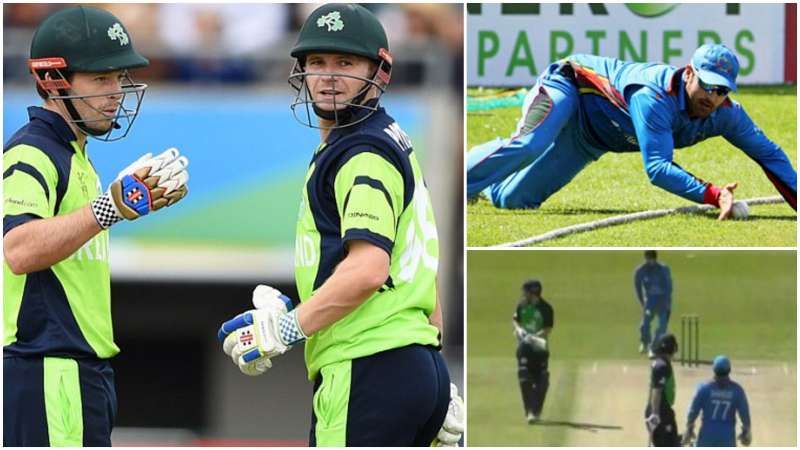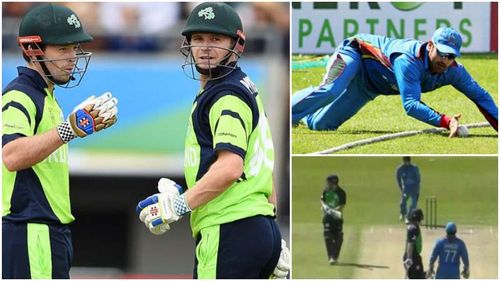
Ireland fuming about controversial run out, Mohammad Nabi's honesty questioned

Ireland have conceded a crucial 1-2 deficit in the currently ongoing ODI series against Afghanistan by losing the penultimate ODI on Sunday by 79 runs, but there is a general sense of fury among the Irish about a controversial incident in the match. Questions have been raised about the honesty of Afghan veteran Mohammad Nabi, and about how the outcome of the match could have been different had Ed Joyce not had to lose his wicket in the sixth over through this incident.
Chasing 230, Irish openers Ed Joyce and William Porterfield had got off to a good start, with the score at 27 for no loss when the fifth ball of the sixth over brought about the incident which has become the biggest talking point from the match, even overshadowing what was a inspired performance by 17-year-old Rashid Khan with both bat and ball.
Joyce had driven a wide ball by Yamin Ahmadzai over extra cover. Rashid Khan and Mohammad Nabi gave chase as the ball trickled away towards the ropes. The batsmen ran two and Porterfield called for a third run. Joyce had his eyes on where the ball went more than his partner, and he stopped running midway between the third run, turning back casually to have a chat with his partner.
However, Nabi had dived and thrown the ball back to Rashid, who had thrown the ball to the bowler’s end, who flicked off the bails. No four had been signalled, and the Afghans were adamant the ball had not crossed the ropes before Nabi had dragged it in.
There was no third umpire for the match. The on-field umpires Alan Neill and C Shamshuddin came together for a consultation, but no decision could be reached. Nabi claimed the ball had not been dead, while the astounded Irish batsmen could not believe that a run out was being claimed for what they thought was a four. Neither of the umpires could give a definite verdict, and they called over Afghan captain Asghar Stanikzai and asked him if his team would retract the appeal and let Joyce bat on.
No such sporting gesture was to be coming from the visitors on this day, and Stanikzai stood by his team’s stance that Joyce had been run out. Joyce had no choice but to leave in a huff. Porterfield, who is also the Ireland captain, was seen having a few disagreeable words with the Afghan players, who were eager to move on with the game.
Ireland suffered a horrible collapse after this, losing the rest of their nine wickets without much protest – all out for 150 in 41 overs.
Speaking after the match, Porterfield said, "We ran past each other, he [Joyce] said he pretty much saw him [Nabi] pass the rope, flick it back. The fielder comes back and says he didn't. I don't know what footage is out there of [this]. The umpires said they are going on his word, and this is as far as it goes for me."
There was no provision for a third umpire using slow motion TV replays during the match, but a picture has been circulated on the social media following the match which shows Nabi having clearly been in contact with ground outside the ropes at the point it is dragged back. Video replays are unclear owing to the limited angles available, but there is one sign that could be telling – Nabi hangs his head just after having thrown the ball to Rashid, as if in resignation that he had failed.
This piece of fielding led to the run out of Ed Joyce in the ODI between Ireland and Afghanistan this afternoon. pic.twitter.com/7AkknNnjvT
— CricketEurope (@CricketEurope) July 17, 2016
Ed Joyce has been run out with a presumed 4. Bad news after the incredible display from @edjoyce24 in ODI3
— Cricket Ireland (@Irelandcricket) July 17, 2016
27/1 6 overs #IREVAFG
Why is everyone piling on to Nabi/Afghanistan in this Joyce runout episode? Umpire is incompetent if he can't see a guy that far over rope.
— Peter Della Penna (@PeterDellaPenna) July 17, 2016
Should Ed Joyce have stopped running without there being a signal from the umpire, based on what he believed he saw? Could Nabi be called to have been cheating, or was he merely following the rules to the letter and giving complete sovereignity to the umpire? Could one of the umpires have done better and moved to a better position from where he could have a view of Nabi’s effort?
One more vital question – if teams ranked 10th and 12th on the basis of ICC’s calculations play under such conditions where there are no third umpires and no recourse to video evidence, in vast contrast to how the higher ranked teams play, what kind of a message is the ICC looking to send to smaller nations making early steps in the sport?